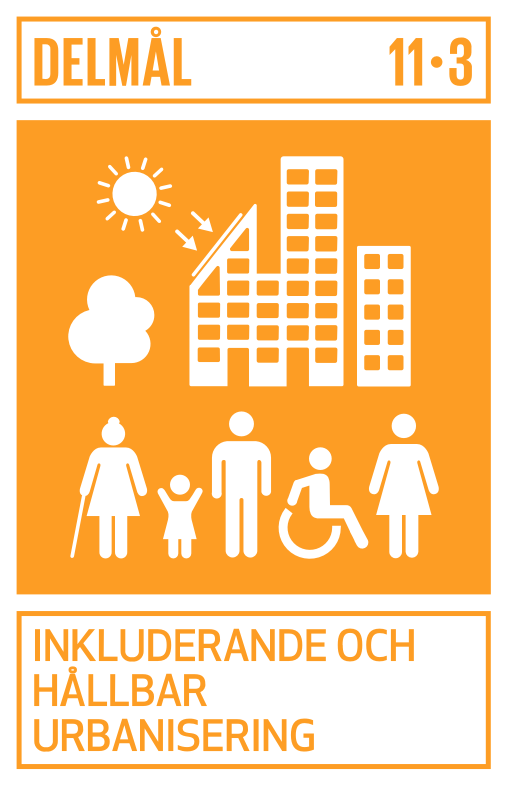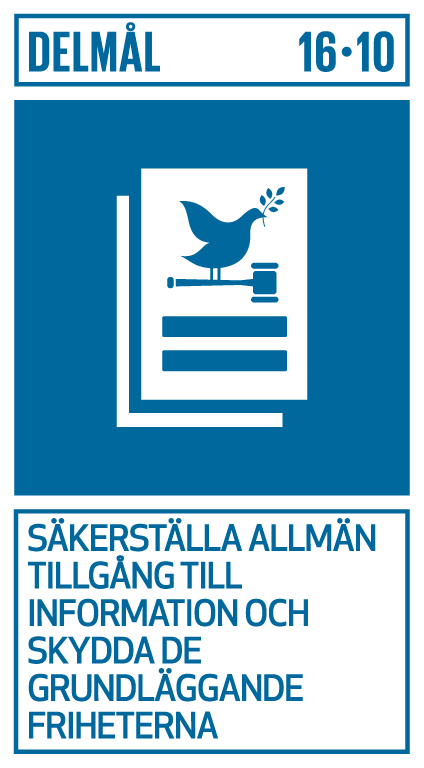Contents of this page may be automatically translated, we take no responsibility for the accuracy of the translation. Feel free to contact our customer support centre if you have any questions.

Lantmäteriet is an important player in the community building and implementation of Agenda 2030 in Sweden through property formation and property registration but also with our geodata.
Sub-goal 1.4
Sub-goal 1.4 means equal rights to property, basic services, technology and financial resources.
Through efficient, legally secure real estate development, Lantmäteriet creates the conditions for sustainable growth in the Swedish society. It lays the foundation for secure property ownership and contributes to a stable economy.
Securing ownership is the basis for a market economy and a functioning credit market. This is obvious in Sweden but is missing in many parts of the world. Uncertain or no boundaries for real estate are a major source of concern and war in the world. Lantmäteriet secures Sweden's properties.
Lantmäteriet contributes to sub-goal 1.4 through its services in several ways:
- In the event of uncertainty as to where a property boundary goes, Lantmäteriet can make a legally binding decision on the location of the boundary through a property determination. Ownership is established and the property owner can use the property with the certainty that they do it on their own land.
- Lantmäteriet has registers of owners and holdings for all about 3.5 million properties in Sweden. This provides a legally secure and secure ownership and is a prerequisite for lending with real estate as security. Property owners can invest in their own property, as well as mortgage the property and use it as collateral for the investments.
- Lantmäteriet s can also decide on community facilities that, among other things, cater the common needs of several properties for roads, water and broadband.
Sub-goal 11.3
Sub-goal 11.3 means inclusive and sustainable urbanization
Smarter community building process
The community building sector is Sweden's single largest sector and affects the entire built environment. Lantmäteriet has been commissioned by the government to work for a smarter community building process.
The first step towards a smarter community building process is national access to geodata which, among other things, gives developers, authorities and other stakeholders access to a coordinated digital process that will make it easier to plan for new housing, green infrastructure and climate adaptation.
The planning process
Lantmäteriet has an important role in the municipalities' planning processes. Lantmäteriet's formal responsibility in the planning process is to work for a correct use of certain types of planning regulations and that a clear and correct presentation is made of certain issues in the planning description. Lantmäteriet services in accordance with the plan.
Göta älv - avalanche protection
Given that 700,000 people have their drinking water source in Göta Älv, a landslide in a polluted area would enter carry a disaster. Therefore, work is underway to secure the landslide area around Göta Älv. Lantmäteriet has delivered property investigations on behalf of SGI in areas where landslide protection is needed. At the same time, the management of future landslide protection facilities must be ensured in some way.
In MSB-ledda Working group Natural-accidents (in swedish, new window) where Lantmäteriet is included, and the project Community facilities for climate adaptation measures is investigating the possibility of forming community facilities to ensure the management of the facilities.
Sub-goal 16.6 and sub-goal 16.10
Sub-goal 16.6 means building efficient, reliable and transparent institutions. Sub-goal 16.10 means ensure public access to information and protect fundamental freedoms.
Lantmäteriet has a great responsibility towards society, this means that the exercise of authority must be transparent and that every citizen has the right to take part in authorities' public documents but also protect information related to person or national security.
To ensure that each employee understands their responsibilities, all receive training in the role of civil servants. Laws that govern our work within these two sub-goals are, for example:
- The principle of public access
- Information security
- GDPR
- The Accessibility Directive
- PSI Directive





